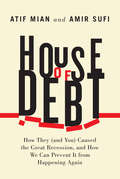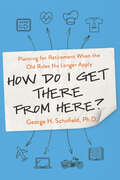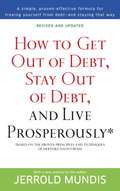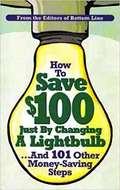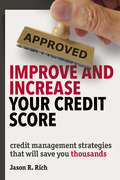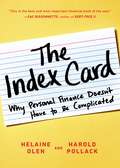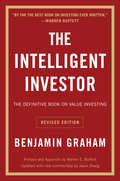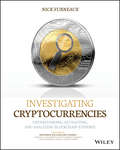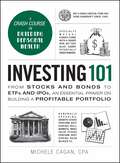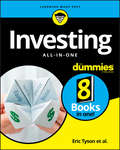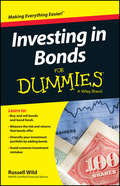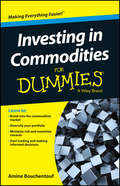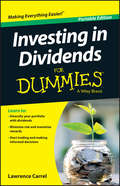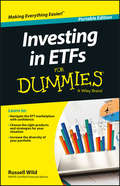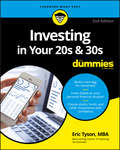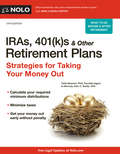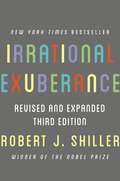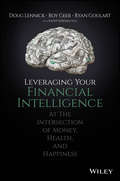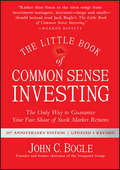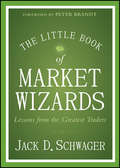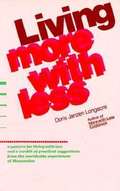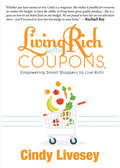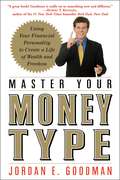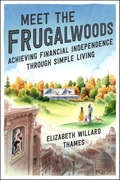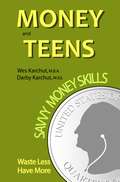Special Collections
Focus on Finance
- Table View
- List View
House of Debt
by Atif Mian and Amir SufiThe Great American Recession resulted in the loss of eight million jobs between 2007 and 2009. More than four million homes were lost to foreclosures. Is it a coincidence that the United States witnessed a dramatic rise in household debt in the years before the recession―that the total amount of debt for American households doubled between 2000 and 2007 to $14 trillion? Definitely not. Armed with clear and powerful evidence, Atif Mian and Amir Sufi reveal in House of Debt how the Great Recession and Great Depression, as well as the current economic malaise in Europe, were caused by a large run-up in household debt followed by a significantly large drop in household spending.
Though the banking crisis captured the public’s attention, Mian and Sufi argue strongly with actual data that current policy is too heavily biased toward protecting banks and creditors. Increasing the flow of credit, they show, is disastrously counterproductive when the fundamental problem is too much debt. As their research shows, excessive household debt leads to foreclosures, causing individuals to spend less and save more. Less spending means less demand for goods, followed by declines in production and huge job losses. How do we end such a cycle? With a direct attack on debt, say Mian and Sufi. More aggressive debt forgiveness after the crash helps, but as they illustrate, we can be rid of painful bubble-and-bust episodes only if the financial system moves away from its reliance on inflexible debt contracts. As an example, they propose new mortgage contracts that are built on the principle of risk-sharing, a concept that would have prevented the housing bubble from emerging in the first place.
Thoroughly grounded in compelling economic evidence, House of Debt offers convincing answers to some of the most important questions facing the modern economy today: Why do severe recessions happen? Could we have prevented the Great Recession and its consequences? And what actions are needed to prevent such crises going forward?
How Do I Get There from Here?
by George H. SchofieldNo matter how far or close you think you are to retirement, this book is your one-stop guide to help you plot your direction for the coming decades.Not long ago everyone knew what the word retirement meant--retire at age 65 after 40 years at the same job and coast through your golden years courtesy of a comfortable nest egg. But now, age expectancy is higher, savings are slimmer, and people change jobs more frequently. Clinging to this outdated concept of retirement only gets you a room in your kids&’ house. Your retirement is going to require an incremental approach to planning--and you must begin now. This requires conscious engagement, diverse interests, and the ability to adapt.In How Do I Get There from Here?, readers will first be directed how to review all their assets--both tangible and intangible--so they can get an honest assessment of where they are right now. Then a journey through self-reflective questions and exercises will:walk you through imagining your future,identifying skills you&’ll need,and learning how to prepare for inevitable twists and turns along the way.Stop clinging to an ancient and stereotypical idea of retirement. Decades of nonstop leisure is not only unreachable for most, it&’s not even truly desirable. Begin now charting the path for a unique, dynamic future you can look forward to!
How to Get Out of Debt, Stay Out of Debt, and Live Prosperously
by Jerrold MundisThe classic guide, revised with up-to-the-minute information!
Out of the Red:
Whether you are currently in debt or fear you're falling into debt, you are not alone. Sixty million Americans--from doctors to secretaries, from executives to the unemployed--face the same problem and live under the same daily stress. Based on the proven techniques of the national Debtors Anonymous program, here is the first complete, step-by-step guide to getting out of debt once and for all. You'll learn:
This book is neither sponsored nor endorsed by Debtors Anonymous. A recovered debtor, the author is intimately familiar with the success of the Debtors Anonymous program.
How to Save $100 by Changing a Lightbulb and 101 Other Money-Saving Steps
by The Editors Of Bottom LineThis book, a compilation of the expert opinions of countless professionals will give you tips and suggestions on how to save money, economize and get more bang for your buck in several areas from your home and family, retirement, purchasing a car, travel, picking the right telephone service and much more.
Improve and Increase Your Credit Score
by Jason R. RichBestselling author Jason R. Rich joins forces with top credit experts and delivers an insider’s guide to credit. Revealing jaw-dropping secrets, strategies and tools, Rich and his team of industry insiders show consumers how to get out from under any credit crunch, and get back in control of their financial future.
Reveals how to increase a credit score, remove incorrect and negative information from credit reports, rebuild destroyed credit, and ultimately, save hundreds, possibly thousands, of dollars every month!
Includes worksheets, exclusive interviews with credit experts and supplemental resources.
The Index Card
by Helaine Olen and Harold PollackTV analysts and money managers would have you believe your finances are enormously complicated, and if you don’t follow their guidance, you’ll end up in the poorhouse.
They’re wrong.
When University of Chicago professor Harold Pollack interviewed Helaine Olen, an award-winning financial journalist and the author of the bestselling Pound Foolish, he made an offhand suggestion: everything you need to know about managing your money could fit on an index card. To prove his point, he grabbed a 4" x 6" card, scribbled down a list of rules, and posted a picture of the card online. The post went viral.
Now, Pollack teams up with Olen to explain why the ten simple rules of the index card outperform more complicated financial strategies. Inside is an easy-to-follow action plan that works in good times and bad, giving you the tools, knowledge, and confidence to seize control of your financial life.
The Intelligent Investor (Revised Edition)
by Benjamin GrahamThe greatest investment advisor of the twentieth century, Benjamin Graham taught and inspired people worldwide. Graham's philosophy of "value investing" -- which shields investors from substantial error and teaches them to develop long-term strategies -- has made The Intelligent Investor the stock market bible ever since its original publication in 1949.
Over the years, market developments have proven the wisdom of Graham's strategies. While preserving the integrity of Graham's original text, this revised edition includes updated commentary by noted financial journalist Jason Zweig, whose perspective incorporates the realities of today's market, draws parallels between Graham's examples and today's financial headlines, and gives readers a more thorough understanding of how to apply Graham's principles.
Vital and indispensable, The Intelligent Investor is the most important book you will ever read on how to reach your financial goals.
Investigating Cryptocurrencies
by Nick FurneauxBitcoin has traditionally been the payment system of choice for a criminal trading on the Dark Web, and now many other blockchain cryptocurrencies are entering the mainstream as traders are accepting them from low-end investors putting their money into the market. Worse still, the blockchain can even be used to hide information and covert messaging, unknown to most investigators.
Investigating Cryptocurrencies is the first book to help corporate, law enforcement, and other investigators understand the technical concepts and the techniques for investigating crimes utilizing the blockchain and related digital currencies such as Bitcoin and Ethereum.
With nearly $150 billion in cryptocurrency circulating and $3 billion changing hands daily, crimes committed with or paid for with digital cash are a serious business. Luckily, Investigating Cryptocurrencies Forensics shows you how to detect it and, more importantly, stop it in its tracks.
Investing 101
by Michele CaganToo often, textbooks turn the noteworthy details of investing into tedious discourse that would put even Warren Buffett to sleep. Investing 101 cuts out the boring explanations, and instead provides a hands-on lesson that keeps you engaged as you learn how to build a portfolio and expand your savings. From value investing to short selling to risk tolerance, this primer is packed with hundreds of entertaining tidbits and concepts that you won't be able to get anywhere else. So whether you're looking to master the major principles of investing, or just want to learn more about stocks and bonds, Investing 101 has all the answers--even the ones you didn't know you were looking for.
Investing All-in-One For Dummies
by Eric TysonFeaturing guidance from renowned finance expert Eric Tyson and content from other top selling For Dummies investment titles, Investing All-in-One For Dummies offers the foolproof, time-tested guidance you need to turn those hard-earned dollars into a successful and diversified portfolio. Covering everything from stocks, bonds, mutual funds, real estate, and the latest in online investing, this hands-on resource lays out an arsenal of techniques for you to select the investment accounts that best suit your particular style, needs, and goals. Investing All-in-One For Dummies offers a succinct framework and expert advice to help readers make solid decisions and confidently invest in the marketplace
There's no time like the present to invest in your own financial future—and this book shows you how.
Investing in Bonds For Dummies
by Russell WildStock, bonds, mutual funds—are all of these elements really necessary in your investment portfolio? Yes! Investing in Bonds For Dummies introduces you to the world of bond investment—and equips you to diversify your portfolio—through the concise and approachable presentation of the details surrounding this form of investment. This engaging text offers a clear, yet thorough take on the background of bond investment, helping you understand why it's such an important part of a well-rounded portfolio. Additionally, the book explores bond returns, risks, and the major factors that can influence the performance of bonds.
When it comes to diversifying your investment portfolio, most financial advisors recommend a strategy that mixes high- and low-risk options, allowing you to protect your investment without being too conservative. Depending upon your age, financial goals, and other key factors, the percentage of your portfolio made up of bonds may vary; however, it's safe to say that bonds will play a role in your investment strategy.
Investing in Bonds For Dummies can keep your investment portfolio from getting stagnant by showcasing why diversification with bonds is essential to a successful investment strategy!
Investing in Commodities For Dummies
by Amine BouchentoufDo you know how commodities stack up against other investment options? Investing In Commodities For Dummies is a straightforward resource that provides an in-depth look at what commodities are and how they might prove beneficial to your portfolio. This approachable reference covers the basics on breaking into the commodities market while dispelling myths and sharing a wide range of trading and investing strategies. Simply put, it spotlights the opportunities on the commodities market while leading you away from the mistakes that have plagued other investors. Use this text to understand how to diversify your portfolio, measure risk, and apply market analysis techniques that guide your decision-making.
Commodities, including oil, silver, gold, and more, play an important role in everyday life. Because they hold such a steady role in today's world, many investors have found them to be a reliable component of a well-rounded portfolio. Depending upon your current investment portfolio and your financial goals, it might be a great idea to add commodities to your strategy.
Whether you're an amateur investor or you're simply looking to expand your investments, Investing In Commodities For Dummies is a fantastic guide to adding commodities to your investment strategy!
Investing In Dividends For Dummies
by Lawrence CarrelInvesting In Dividends For Dummies shares the fundamental information you need to know about one of the steadiest investments you can make: dividends. This approachable resource provides you with the details necessary to make confident, educated decisions regarding the dividends that you choose to add to your portfolio. Instead of guessing which investments will complement your current strategy, leverage the information offered by this easy-to-use text to determine how to best incorporate dividends into your investment tactics—and do so with confidence.
The steady nature of dividends makes them appealing to investors for many reasons. Most notably, they're a great option if you're entering retirement and want a reliable source of income. Additionally, dividends are fantastic components of a well-rounded investment portfolio, as even the most aggressive of investors can benefit from more conservative investment tools in their overall strategy. Understanding what dividends are and how to use them is the first step to adding them to your portfolio.
Investing In Dividends For Dummies is a fantastic resource if you're looking to find a mature and predictable way to invest your money!
Investing in ETFs For Dummies
by Russell WildWhether you are a seasoned investor or you're just getting into the investment game, one thing is certain: you need to diversify! Investing In ETFs For Dummies is a practical, easy-to-use resource that introduces you to the world of exchange-traded funds—and provides you with the knowledge you need to incorporate ETFs into your investment strategy. Discover commodity ETFs, style ETFs, country ETFs, and inverse ETFs, all of which play an important role in this new trading environment. Supplement your knowledge with an understanding of the risks and rewards associated with ETF investments, and consider how ETF investments can complement your current portfolio.
Though not as well-known as some other investment options, ETFs are wonderful tools for filling in the gaps in your investment portfolio. These investment options have the power to give you access to markets or investment areas that, otherwise, may be restricted, too expensive, or exceedingly risky—and can open investment doors you may have not yet considered.
Investing in ETFs For Dummies is a great resource if you're looking to enhance your investment portfolio by participating in the ETF market!
Investing in Your 20s and 30s For Dummies
by Eric TysonIn order to build a retirement portfolio that is capable of covering expenses in your golden years, it's necessary to start saving while you're young. Many individuals realize the importance of investing early in life, but simply don't know where to begin.
Investing in Your 20s & 30s For Dummies provides emerging professionals, like yourself, with the targeted investment advice that you need to establish your own unique investment style. Covering everything from the latest tax laws to new and improved investing funds, this latest edition helps you evaluate assets and manage risk to invest money wisely, and monitor your progress.
There's no time like the present to start investing. So, get started today!
IRAs, 401(k)s & Other Retirement Plans
by John C. Suttle and Twila SlesnickIf you have a retirement plan, IRAs, 401(k)s & Other Retirement Plans is your comprehensive guide to taking money out of it. Make sense of the complex tax rules governing when you can — and when you need to — take money out of your plan, and how much you can take out. Most importantly, avoid the penalties that many folks have to pay because they don't take their required minimum distributions.
In plain English, this book covers the most common retirement plans, including 401(k)s, IRAs, profit-sharing plans, Keoghs, pensions, and tax-deferred annuities. It helps you answer these questions:
Completely updated, IRAs, 401(k)s & Other Retirement Plans provides clear examples to guide you through the decision-making process and making calculations. Samples of tax forms required by the IRS are also included, as well as easy-to-follow instructions on completing them.
Irrational Exuberance
by Robert J. ShillerWhy the irrational exuberance of investors hasn't disappeared since the financial crisisIn this revised, updated, and expanded edition of his New York Times bestseller, Nobel Prize–winning economist Robert Shiller, who warned of both the tech and housing bubbles, cautions that signs of irrational exuberance among investors have only increased since the 2008–9 financial crisis. With high stock and bond prices and the rising cost of housing, the post-subprime boom may well turn out to be another illustration of Shiller's influential argument that psychologically driven volatility is an inherent characteristic of all asset markets. In other words, Irrational Exuberance is as relevant as ever. Previous editions covered the stock and housing markets—and famously predicted their crashes. This edition expands its coverage to include the bond market, so that the book now addresses all of the major investment markets. It also includes updated data throughout, as well as Shiller's 2013 Nobel Prize lecture, which places the book in broader context. In addition to diagnosing the causes of asset bubbles, Irrational Exuberance recommends urgent policy changes to lessen their likelihood and severity—and suggests ways that individuals can decrease their risk before the next bubble bursts. No one whose future depends on a retirement account, a house, or other investments can afford not to read this book.
Leveraging Your Financial Intelligence
by Douglas Lennick and Roy Geer and Ryan GoulartAre you one of the 90% of people who are stressed about money? If so, you know it can take its toll on every part of your life. Financial health, physical health and happiness are profoundly interconnected. It's almost impossible to enjoy any one of these without the help of the other two. The authors describe this phenomenon as the intersection of money, health, and happiness.
Leveraging Your Financial Intelligence will teach you a powerful values-based approach to achieving your most important life goals. As you take steps to improve your financial well-being, you'll discover that leveraging your financial intelligence will also fuel your physical and emotional well-being.
Backed by the latest research findings in neuroscience, psychology, health, and cultural anthropology, the authors' invaluable advice focuses on the practical actions you can take to improve not just your finances, but your overall life satisfaction.
You'll be inspired by meeting people from all walks of life who have leveraged their financial intelligence to build financial security, promote fitness and health, and increase their daily sense of happiness.
Proven recommendations from the authors' work with countless clients, along with worksheets, self-assessments, and other tools will help you apply the book's concepts to enhance your own financial, physical and emotional health.
Use the strategies presented in this book to leverage your financial intelligence in a way that's tailored to your individual circumstances and allows you to create your own extraordinary intersection of money, health, and happiness.
The Little Book of Common Sense Investing
by John C. BogleThe Little Book of Common Sense Investing is the classic guide to getting smart about the market. Legendary mutual fund pioneer John C. Bogle reveals his key to getting more out of investing: low-cost index funds. Bogle describes the simplest and most effective investment strategy for building wealth over the long term: buy and hold, at very low cost, a mutual fund that tracks a broad stock market Index such as the S&P 500.
While the stock market has tumbled and then soared since the first edition of Little Book of Common Sense was published in April 2007, Bogle’s investment principles have endured and served investors well. This tenth anniversary edition includes updated data and new information but maintains the same long-term perspective as in its predecessor.
Bogle has also added two new chapters designed to provide further guidance to investors: one on asset allocation, the other on retirement investing.
A portfolio focused on index funds is the only investment that effectively guarantees your fair share of stock market returns. This strategy is favored by Warren Buffett, who said this about Bogle: “If a statue is ever erected to honor the person who has done the most for American investors, the hands-down choice should be Jack Bogle. For decades, Jack has urged investors to invest in ultra-low-cost index funds. . . . Today, however, he has the satisfaction of knowing that he helped millions of investors realize far better returns on their savings than they otherwise would have earned. He is a hero to them and to me.”
Bogle shows you how to make index investing work for you and help you achieve your financial goals, and finds support from some of the world's best financial minds: not only Warren Buffett, but Benjamin Graham, Paul Samuelson, Burton Malkiel, Yale’s David Swensen, Cliff Asness of AQR, and many others.
This new edition of The Little Book of Common Sense Investing offers you the same solid strategy as its predecessor for building your financial future.
While index investing allows you to sit back and let the market do the work for you, too many investors trade frantically, turning a winner’s game into a loser’s game. The Little Book of Common Sense Investing is a solid guidebook to your financial future.
The Little Book of Market Wizards
by Jack D. SchwagerWhat differentiates the highly successful market practitioners—the Market Wizards—from ordinary traders? What traits do they share? What lessons can the average trader learn from those who achieved superior returns for decades while still maintaining strict risk control? Jack Schwager has spent the past 25 years interviewing the market legends in search of the answers—a quest chronicled in four prior Market Wizards volumes totaling nearly 2,000 pages.
In The Little Book of Market Wizards, Jack Schwager seeks to distill what he considers the essential lessons he learned in conducting nearly four dozen interviews with some of the world's best traders. The book delves into the mindset and processes of highly successful traders, providing insights that all traders should find helpful in improving their trading skills and results.
Stepping clearly outside the narrow confines of most investment books, The Little Book of Market Wizards focuses on the value of understanding one's self within the context of successful investing.
Living More with Less
by Doris Janzen LongacreWhat we have needed are good concrete models [of simple living]. This book fills that vacuum. Practical, workable models are here by the score. Nor are they theoretical models conceived by ivory-tower academicians. They are the personal testimonies of ordinary people all over the world who have begun the pilgrimage toward simplicity.
Living Rich with Coupons
by Cindy LiveseyEntering the crazy world of couponing can literally change your life and your lifestyle! You’ll start making ends meet, pay off your debt, create a financial cushion, and feel freer and happier than you’ve felt in years, maybe decades. That’s living rich with coupons!
Use the tools you get from this book to build your superpowers. Even Wonder Woman needs her indestructible bracelets, and you’re about to receive yours. It doesn’t matter if you make $15,000 a year or $250,000 a year—everyone needs a budget they can stick to and follow.
Cindy helps you to uncover every savings opportunity at your local stores. You’re going to find out exactly what you need to do to save and how to use those coupons correctly.
Master Your Money Type
by Jordan E. GoodmanThis groundbreaking book by renowned finance expert Jordan Goodman shows readers how to use their personal investing type to attain the wealth they desire. From the Status Seeker to the White Night to the High Roller, every investor falls into a category. Bag Lady or Optimist, Coaster, Debt Desperado, or Ostrich, each has specific characteristics and instincts. Now, financial guru Jordan Goodman offers readers a quiz to identify their own individual Money Type. Then, by categorizing the strengths and weaknesses of each type of investor, he highlights the pitfalls readers should beware of in their own financial planning. With precise investment advice for each Money Type, Jordan Goodman offers clear, simple instructions for readers to minimize their efforts and maximize their gain.
Meet the Frugalwoods
by Elizabeth Willard ThamesThe deeply personal story of why award-winning personal finance blogger Elizabeth Willard Thames abandoned a successful career in the city and embraced extreme frugality in order to create a more meaningful, purpose-driven life and retire to a homestead in the woods at age thirty-two with her husband and daughter.In 2014, Elizabeth and Nate Thames were conventional 9-5 young urban professionals. But the couple had a dream to become modern-day homesteaders in rural Vermont. Determined to retire as early as possible in order to start living each day—as opposed to wishing time away working for the weekends—they enacted a plan to save an enormous amount of money: well over seventy percent of their joint take home pay. Dubbing themselves the Frugalwoods, Elizabeth began documenting their unconventional frugality and the resulting wholesale lifestyle transformation on their eponymous blog.In less than three years, Elizabeth and Nate reached their goal. Today, they are financially independent and living out their dream on a sixty-six-acre homestead in the woods of rural Vermont with their young daughter. While frugality makes their lifestyle possible, it’s also what brings them peace and genuine happiness. They don’t stress out about impressing people with their material possessions, buying the latest gadgets, or keeping up with any Joneses. In the process, Elizabeth discovered the self-confidence and liberation that stems from disavowing our culture’s promise that we can buy our way to "the good life." Elizabeth unlocked the freedom of a life no longer beholden to the clarion call to consume ever-more products at ever-higher sums.Meet the Frugalwoods is the intriguing story of how Elizabeth and Nate realized that the mainstream path wasn’t for them, crafted a lifestyle of sustainable frugality, and reached financial independence at age thirty-two. While not everyone wants to live in the woods, or quit their jobs, many of us want to have more control over our time and money and lead more meaningful, simplified lives. Following their advice, you too can live your best life.
Money and Teens
by Wesley Karchut and Darby KarchutDon't take on the world without this book. Learn the essential money skills before you: hand over your credit card, take out a student loan, sign up for a car loan, start a new job, buy one more thing online. Practical, no-nonsense guide to managing your money so that you waste less and have more.
This book offers real-life skills you can use right away, not fake promises to make you rich or to find "easy money. " "I learned more about managing my money than I learned in school or from my parents. " Learn how to avoid the money minefields awaiting you at every turn. Don't waste another dime on fees, sneaky retailer pricing games, and online come-ons. Master the essential money skills - not theory - and apply them right away.
Endorsed by the Jumpstart Coalition for Personal Financial Literacy, a non-profit coalition of public and private sponsors committed to furthering financial literacy for K-12 with chapters in 49 states.
